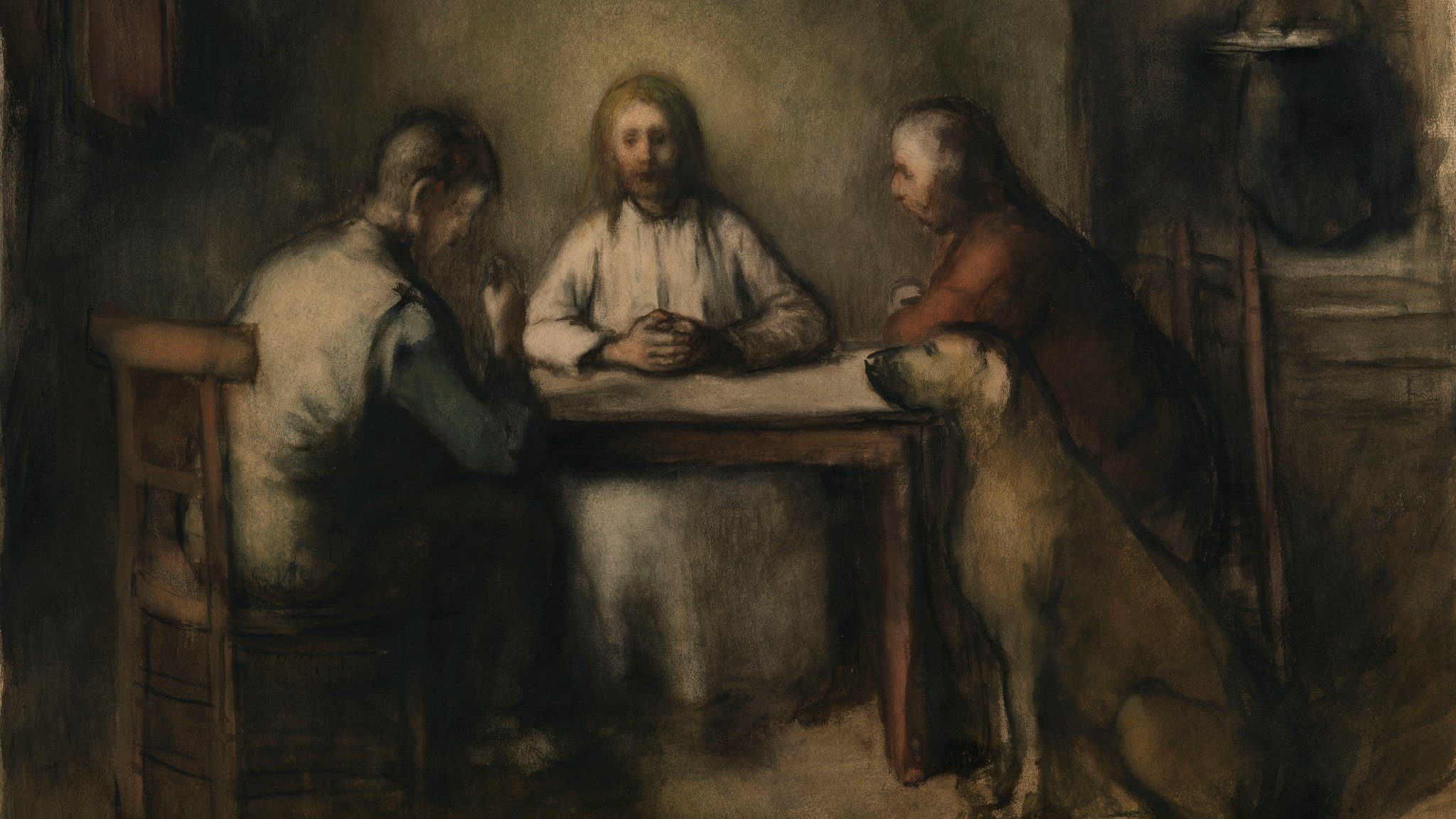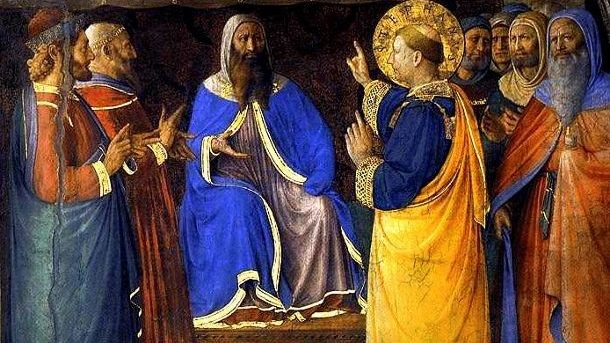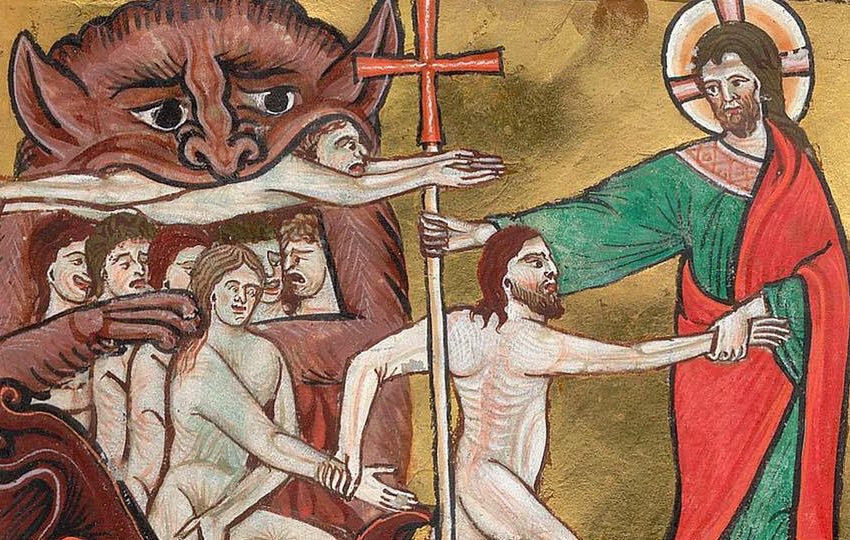First Things First
3rd Sunday of Easter

There is an old saying: First things first. It’s a tried and true principle for keeping your priorities straight. Whether you have multiple things on your to-do list or a conflict in your schedule that needs sorting out, remembering to put first things first helps ensure that what’s most important doesn’t get neglected.
If you have a paper due at the end of the week, and another assignment that isn’t due for another month, you focus on the deadline that’s more pressing. If you have enough money to pay your rent or buy tickets to a concert, but not both, you pay your rent because shelter is more important than entertainment. If your employer tells you to do something that contradicts the law of God, you obey God because God is the higher authority. First things first.
One of the best things I ever did for my prayer life was to start the habit of beginning my day with prayer. I wanted to incorporate daily prayer into my life but was struggling to find a consistent time to fit it in. I’d get to the end of the day and realize I forgot to pray, and because I was tired it was easy to say, “Oh well, I’ll worry about it tomorrow.” Things got better when I decided to put first things first and pray at the start of my day, before I became involved in anything else.
We naturally give things that are important to us priority in our schedules. So what’s so important to you that it comes before anything else in your daily routine? That’s a good question to help us reflect on our own priorities. Another good question to reflect on is this: what’s so important to Jesus that it comes before anything else?
The gospel passages for this Sunday and last Sunday each relate what Jesus did on the day of the Resurrection. After conquering death and returning triumphally to life, what are the first things on Jesus’ to-do list? Whatever they are, those things must be very important to Our Lord.
How Jesus Spent Easter Sunday
Last Sunday we read of how Jesus appeared to the Apostles in the Upper Room and breathed on them, saying, “Receive the Holy Spirit. Whose sins you forgive are forgiven them, and whose sins you retain are retained” (Jn 20:22-23), establishing the Sacrament of Reconciliation. One of the first things Jesus did after the Resurrection was to grant the Church the authority to forgive sins in his name.
This Sunday we read of the encounter between two disciples and Jesus on the road to Emmaus. As Jesus accompanied them on the way, he explained the scriptures to them. And when they arrived at their home he broke bread with them. The gospel says, “he took bread, said the blessing, broke it, and gave it to them” (Lk 24:30) and they recognized him in the breaking of the bread.
This sequence of events — taking, blessing, breaking, and giving the bread — is specific and intentional. It describes a ritual meal, namely the ritual meal that Christ instituted at the Last Supper that we know today as the Mass.
Here is how it is described in Matthew’s gospel: “Jesus took bread, said the blessing, broke it, and giving it to the disciples said, ‘Take and eat; this is my body'” (Mt 26:26).
Mark’s gospel says: “He took bread, said the blessing, broke it, and gave it to them, and said, ‘Take it; this is my body'” (Mk 14:22).
And in Luke’s description of the Last Supper, Jesus “took the bread, said the blessing, broke it, and gave it to them, saying, ‘This is my body, which will be given for you; do this in memory of me'” (Lk 22:19).
This is the Mass. Think about what you see at every Mass you attend. After first having the scriptures explained to us in the Liturgy of the Word, the priest takes the bread that is offered. He blesses it, saying the words of consecration, the very words of Christ, “This is my body.” He then breaks it in what is called the fracturing rite as the faithful sing, Agnus Dei, “Lamb of God, you take away the sins of the world…” And then he gives it to the faithful, saying “The Body of Christ,” to which we all say, “Amen.”
The last thing Jesus did before he entered into his Passion was to institute the Eucharist. And one of the first things Jesus did after he rose from the dead was to celebrate that same Eucharist. First things first. That should speak volumes to us about the importance of the Eucharist to our faith. Is it any wonder that the Second Vatican Council called the Eucharist “the source and summit of the Christian life” (Lumen Gentium 11)?
Sacraments of Union
Confession and the Eucharist, the sacraments we read about last Sunday and this week, are both ordered toward the same end — union with God. By receiving the Eucharist — what we call Holy Communion — we are taking Jesus’ sacramental Body into our own bodies, in an act filled with nuptial significance. His flesh becomes one with our own. In order to receive Communion fruitfully and honestly we must actually be in communion with Christ and His Church, which begins with baptism, where we sacramentally die to our old selves and become born again in Christ, as members of His Body, the Church.
But what happens if we commit grievous sin after baptism? Mortal sin, when it is freely chosen, separates us from God’s grace because it is incompatible with a life of love. But God never forsakes us. He provides us with a remedy for our post-baptismal sins — Confession, otherwise known as the Sacrament of Reconciliation. The whole point of Confession is to return us to a state of grace so that we may once again participate fully at the Lord’s table and receive Him in the Eucharist.
Of all the sacraments that we have been learning about in recent weeks during our Credo discussions, only two do we receive with any regularity. Baptism and Confirmation are received only once, never repeated. Matrimony for most people is celebrated once, and may be celebrated again only if one spouse dies and the other decides to remarry. Most members of the Church don’t receive Holy Orders at all, and those that do can receive that sacrament a maximum of three times if they are ordained a deacon, a priest, and then a bishop. And if you are a relatively healthy person, hopefully you shouldn’t need to receive the Anointing of the Sick with any frequency.
But the two sacraments that we participate in over and over again as part of our regular lives as Christians, are the Eucharist and Reconciliation; our daily bread and our daily bath, the sacraments established on Holy Thursday and Easter Sunday, the beginning and end of the Triduum and therefore the sacraments most closely associated with the Paschal Mystery. When we speak of participating in the sacramental life of the Church, this is what we mean. These are the means of grace that are chiefly meant to sustain us on our pilgrimage in this world and to bring us closer to God; the sacrament of Christ’s mercy and the sacrament of Christ’s presence.
Sacramental Priorities
How often should you receive the Eucharist? The minimum established by the Church to remain a Catholic in good standing is once per year (during the Easter season). But Catholic Christians are invited to receive the Eucharist at any Mass they attend (up to twice in one day) provided they are properly disposed; that is, they have fasted for one hour and are not conscious of any unconfessed grave sin.
How often should you go to Confession? Again, the minimum established by the Church is once per year (to prepare you for your yearly Communion). But why settle for the minimum? If you have committed a mortal sin — which is to say a serious sin which you committed with full knowledge and free will — then you need to go to Confession as soon as possible and should not receive the Eucharist until you do. But apart from that, it is very helpful to your advancement in the spiritual life to go to Confession on a regular schedule.
It’s good to confess even venial sins (those little imperfections we all commit by failing to love God and love one another as well as we ought). It keeps you close to Christ’s heart of mercy, which is where you want to be. Just like going to the dentist for a routine cleaning every six months keeps you from getting cavities, going to regular Confession keeps you from falling into mortal sin. I recommend going monthly, but that’s not a magic number; go more or less often if it works better for you. The important thing is to go, and make it a habit.
These two sacraments are important to the life of the Church because they are important to Christ — so important that they were his top priorities after the Resurrection, the first things he wanted to do after he rose from the dead. If we want to be close to Jesus, these sacraments should be important to us, too, because they are the very means he established to be close to us.
As I said, Confession and Eucharist are both ordered toward union with God. This tells us something that is vital to our faith. It’s the most important and mind blowing truth in the world, but one we so often take for granted: God wants to be with us. These two sacraments are special to Christ, because you are special to Christ. So if you really want to know what Jesus’ priorities are, what’s most important to him, just look in the mirror.
Happy Easter! Christ is Risen! Alleluia!



